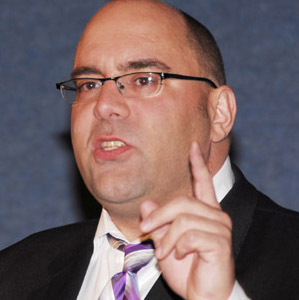S1E72: A World Wide Web of COVID Conspiracies / Graham Brookie, Devin Burghart, Bret Schafer, Judy Twigg
“Disinformation is a deliberate falsehood put out to mislead an audience. But what we see more of are true bits of information where necessary context has been removed or manipulated in a way that makes it technically true but wildly misleading.” -Bret Schafer
In this episode of EPIDEMIC, we’re going to look at disinformation during the pandemic. Specifically, we’re going to look at how the Russian government and far-right militias are using vaccine disinformation to push their agendas. We’ll look at the motivations behind disinformation campaigns, why they can be so convincing, and what can be done about them.
This podcast was created by Just Human Productions. We’re powered and distributed by Simplecast. We’re supported, in part, by listeners like you.
Brett Schafer: If you would sort of boil down Russia’s messaging on vaccines, it was a concerted effort to promote the Sputnik vaccine, while denigrating their Western competitors.
Judy Twigg: COVID vaccines are a multi-billion dollar business and Russia is angling very much for some of that market share.
Céline Gounder: You’re listening to EPIDEMIC, the podcast about the science, public health and social impacts of the coronavirus pandemic. I’m your host, Dr. Celine Gounder.
In 1983, an article appeared one day in an Indian newspaper called The Patriot. The Patriot was a small newspaper but the story it published would go on to have a big impact. It falsely alleged that the U.S. military manufactured HIV as a bioweapon. Soon, the story started to reappear in other newspapers around the world.
Graham Brookie: And it became a fairly prominent global conspiracy theory.
Céline Gounder: This is Graham Brookie.
Graham Brookie: I’m the director of the Digital Forensic Research Lab at the Atlantic Council and a former employee at the National Security Council at the White House.
Céline Gounder: Graham studies disinformation campaigns.
Graham Brookie: The definition of disinformation is really important here. Disinformation is defined as false information with the intent to mislead.
Céline Gounder: And this one — known as Operation Denver — was one of the most successful in history. According to KGB defectors, the Soviet Union planted the original story in that Indian newspaper.
Graham Brookie: It got a lot of traction because they amplified it through other state backed sources. So what we would refer to as circular amplification, where a Source A puts something out that is false or unverified; Source B cites Source A that says, ‘Oh, well, Source A reported this, so we’re going to take it as something we’re going to report. And then Source A goes back and cites Source B on the same thing.
Céline Gounder: Over the next several years the false story spread more and more until… one night… it made it on to prime time American television.
News Clip: A Soviet Military publication claims the virus that causes AIDS came from a US Army laboratory conducted experiments in biological warfare.
Céline Gounder: That was Dan Rather reporting the bogus story on the CBS Evening News in 1987.
Graham Brookie: That’s even before the internet started. And so you can imagine the scenario that we are now in, where it’s very, very easy to put something on the internet and then amplify it by other sources.
Céline Gounder: Operation Denver shows that public health has been the target of disinformation campaigns for a long time.
Graham Brookie: And so where we’ve seen an enormous amount of state disinformation is around the origin story of coronavirus.
Céline Gounder: It’s the same playbook as Operation Denver back in the 1980s.
Graham Brookie: And once we’ve gotten into a back-and-forth about unverified information, the one thing that is not happening is an effective public health response. And that’s a very dangerous place for us to beat not only in terms of an effective public health response, but a pretty dangerous place for us to be in terms of geopolitics as well.
Céline Gounder: Today on EPIDEMIC, we’re going to look at disinformation during the pandemic. Specifically, we’re going to look at how the Russian government and far-right militias are using pandemic disinformation to push their agendas. We’ll look at the motivations behind disinformation campaigns…
Judy Twigg: So there are definitely political gains to be had here, reputational gains. I think also we should mention that there are financial gains to be had as well.
Céline Gounder: Why these messages can be so convincing…
Brett Schafer: A piece of truth exists there, but the way it is presented, it gives a very warped perspective of reality.
Céline Gounder: And what can be done about it.
Devin Burghart: The research right now shows pretty effectively that deplatforming works. It is a necessary, but insufficient step in dealing with this challenge.
Céline Gounder: Today on EPIDEMIC… Russian and far-right vaccine disinformation.
Russia has emerged as one of the biggest sources of disinformation about the pandemic and, most recently, vaccines.
Judy Twigg: We do know that Russia going back to Soviet days has quite a history of health-related disinformation designed to sow confusion, mistrust, discord in the way Western countries and the developing world are dealing with global pandemics.
Céline Gounder: This is Judy Twigg. She’s a Professor of Political Science at Virginia Commonwealth University. Judy says the Russian government treated vaccine development like another space race with the West. The original Sputnik was the first artificial satellite launched into space by the USSR. And Sputnik V was the first COVID vaccine to get government approval.
BBC report: Russia has become the first country to give regulated approval to a COVID-19 vaccine. President Vladimir Putin has made no secret to be the first to win the global vaccine race.
CBC report: But there are myriad questions and concerns already. A vaccine so quickly, and from a country notorious for propaganda, has many worrying – not only does it work, but is it safe?
Judy Twigg: Russia approved the Sputnik V vaccine back in August of 2020, before it had even entered large scale clinical trials, phase three clinical trials.
Céline Gounder: It was a huge gamble. But it paid off. A peer-reviewed study published in The Lancet medical journal later claimed the Sputnik V vaccine to be 90% effective. Numerous scientists have since found inconsistencies in the data and said it looks “too good to be true.” And just this week, there have been new safety concerns raised with respect to the Sputnik V vaccine. But, Judy says:
Judy Twigg: Having had the first COVID vaccine, put Russia on the map not only as a scientific great power, but just as a geopolitical great power.
Céline Gounder: Judy says that decisions taken by wealthier nations early in the pandemic created an opportunity for Russia to use its vaccine to expand its influence abroad. She says many of the Trump administration’s decisions to withdraw from international health organizations, like the WHO, created a gap Russia could fill.
Judy Twigg: If you go to the Sputnik V website, you’ll see that the tagline, the motto, slogan for the Sputnik V vaccine is, “a vaccine for all mankind.”
Céline Gounder: Russian influence campaigns in regions like Africa and Latin America have leaned into the perception of wealthy nations hoarding vaccines.
Judy Twigg: And then the vaccine diplomacy, just let Russia run with this in a context where most of the rich countries through their pre-purchasing of many times more vaccine than they needed to cover their own populations had created the impression of a selfish vaccine nationalism among the United States, Western Europe, Canada.
Céline Gounder: The Russian government has donated Sputnik V vaccines to 20 countries.
Judy Twigg: And from what we can tell, those are kind of like free samples, you know, lost leaders intended to get those countries to buy significant quantities of Sputnik V.
Céline Gounder: But the vaccine is also being used to exacerbate internal divisions inside the European Union. This is happening against the backdrop of a troubled vaccine rollout there.
Judy Twigg: Clearly the aim here is to drive a wedge into the European union to destabilize it, to try to get individual European union members to approve, use, manufacturer the Sputnik V vaccine.
Céline Gounder: The former Soviet state of Hungary was the first EU member to approve Sputnik V back in February. Since then, the Czech Republic, Slovakia, and Austria have expressed interest too. Even Germany is in talks to buy 30 million doses of Sputnik V. The Russian government isn’t just using its Sputnik V vaccine to gain political points. It’s attacking the safety and efficacy of other vaccines.
Brett Schafer: They were really hammering Pfizer, and to a lesser degree, Moderna.
Céline Gounder: That was Brett Schafer. Brett is the Media and Digital Disinformation Fellow at the Alliance for Securing Democracy. Brett and his team conducted a study of Russian disinformation over a three month period.
Brett Schafer: And what we saw is that there was just wildly different messaging around the different vaccines. And it was often sort of pegged to geopolitical concerns.
Céline Gounder: One of the best examples is what happened with the AstraZeneca and Pfizer-BioNTech vaccines. Earlier in the pandemic, Russian disinformation campaigns were aggressively attacking the credibility of the AstraZeneca vaccine. But…
Brett Schafer: In late November, Sputnik and AstraZeneca combined forces to try to improve the vaccine’s efficacy. And then we saw the Russian States sort of massage their messaging and it became softer and it became more positive, generally speaking.
Céline Gounder: The disinformation campaign then started attacking the safety of the Pfizer vaccine.
Brett Schafer: So looking at the top 50 Messages on Twitter from Russian state media mentioning Pfizer, roughly about 80% we coded as being negative. And if you just ran through the stories, it was just sort of a horror show of what would happen if you took the Pfizer vaccine.
Céline Gounder: Pfizer’s vaccine is safe and effective. It’s 95% effective in preventing COVID. But some people do very rarely have allergic reactions to the vaccine.
Brett Schafer: What they have done is just find every single instance of there being a problem around the world with Pfizer. These instances are covered over and over and over again. So sort of drip by drip, they’re putting out this perception that Pfizer is not safe.
Céline Gounder: Brett says oftentimes these alleged cases of allergic reactions — or even death — end up having nothing to do with the vaccine. But a flashy headline and the speed of social media is all that’s needed to sow distrust.
Brett Schafer: They’re pushing out true bits of information, but information where necessary context has been removed or manipulated in some way. So it is often true, but wildly misleading.
Céline Gounder: Even though Russian disinformation efforts have targeted places like Ukraine with anti-vaccine messages in the past, Brett doesn’t think that’s their goal now.
Brett Schafer: I don’t think Russia’s end goal here is to create vaccine skepticism. So I think what they want to do, generally speaking, is promote their vaccine over other vaccines. Although that’s really not the case, obviously in the U S that has an approved Sputnik. And then I think just to sort of tweak grievances where they can.
Céline Gounder: Those grievances might be playing on political disputes within countries like the United States over social distancing measures and mask-mandates. But this same content pushed out by disinformation campaigns can be like a gateway drug to more disinformation.
Brett Schafer: So then once you’re in this sort of fold of the Russian media ecosystem, you get their point of view on Syria, Ukraine, other geopolitical areas that they have more of a concerted interest. The communities that we look at, they aren’t rigid in their belief system. Sometimes if you have sort of a conspiratorial view of the world, that can be manipulated around many different topics.
Céline Gounder: We’ll find out how vaccine disinformation is being used as a recruitment tool by far-right militias… and what we can do about it… after the break.
***
Céline Gounder: Russia isn’t the only player in the field of disinformation. Lots of non-state actors in the United States have been using disinformation campaigns during the pandemic for their own goals — especially on social media. Devin Burghart is the executive director of the Institute for Research and Education on Human Rights.
Devin Burghart: Social media platforms have provided a massive reach to far-right groups using disinformation around the vaccine, and they’ve also swelled their ranks as a result of having this massive amount of access to new recruits.
Céline Gounder: Devin says membership in far-right militia organizations spiked during the pandemic. His organization estimates that more than three million people joined one or more of 1,100 far-right Facebook groups they’re tracking.
Devin Burghart: This includes everything from groups who are militantly concerned about reopening the economy to anti-masker groups, to those who are promoting disinformation around the, the vaccine and the pandemic to people who are denying the pandemic.
Céline Gounder: Devin says before the pandemic, these militia groups used to be made up of 80% men, 20% women.
Devin Burghart: Those numbers have changed because of COVID and the way that far-right has have targeted, particularly different women’s groups on Facebook. They’ve used these kinds of fears about the impacts on children and on families as a way to encourage more and more women to take up arms against those who are trying to keep us safe from the pandemic.
Céline Gounder: Devin says that disinformation like this demands aggressive action. What used to stay online… is increasingly spilling into the real world.
Devin Burghart: Far too often, we’re now seeing the ramifications of that occur on the ground. So whether it be the attempts by anti-vaxxers who block access the vaccine distribution site at Dodger stadium, to the violent anti masker protest we’ve seen too, the storming of the capitals.
Céline Gounder: Devin says the current measures taken by social media companies don’t go far enough. He would like to see Congress tackle the topic. But in the meantime he supports kicking these accounts offline.
Devin Burghart: The research right now shows pretty effectively that deplatforming works, that it makes it a lot harder for them to do that work. It is a necessary, but insufficient step in dealing with this challenge.
Céline Gounder: But Graham Brookie says kicking people off social media platforms may also have unintended consequences.
Graham Brookie: Content moderation is almost by design a game of whack-a-mole. If for instance, Twitter had the perfect disinformation and misinformation policy that eradicated both from their platforms, then the users who had done that on that platform would go to another platform.
Céline Gounder: Basically, the internet is a big place and these bad actors will find a new foothold eventually.
Graham Brookie: And we’ve seen that happen with some of these kind of more alternative platforms like Gab or Parler or a number of platforms that have become somewhat infamous over the last year year for that precise thing. That’s what I mean by we’re playing a game of whack-a-mole, and it’s clearly not working.
Céline Gounder: And sometimes getting kicked off a social media platform is part of the plan. For example, there was a video full of conspiracy theories about the pandemic that was spreading around the internet last summer. It got a ton of attention and was eventually taken down by companies like YouTube and Facebook.
Graham Brookie: When it was removed by a platform then become became the subject of disinformation. And so there was this boomerang effect, where were the people that were sharing and spreading that video said, well, “this is the video that Facebook doesn’t want you to see,” so click here.
Céline Gounder: And disinformation isn’t always a one-way street.
Judy Twigg: I would argue that where we can most directly see the impact of some of this Russian vaccine disinformation is actually in Russia itself
Céline Gounder: Judy Twigg again.
Judy Twigg: Russia’s actions here have backfired and impacted their vaccine uptake at home so that now we have a situation in Russia where supply of Sputnik V actually exceeds demand, especially in Moscow. In Moscow, you can walk off to just about any clinic and get vaccinated with Sputnik V right off the bat without having to pre-register or wait in line, because there are so few people who are lining up to take the vaccine.
Céline Gounder: Judy says vaccine confidence is low in Russia because of the speed of Sputnik V’s approval and all the accumulated vaccine disinformation the government has been pumping out all these years.
Judy Twigg: They shot themselves in the foot. At the very beginning, they, they launched Sputnik V with such aggressive fanfare that it led people inside Russia and of course, many outside Russia to distrust the product. And months later, we learned that the product is in fact safe and effective, but it’s been very hard for it to shed that aura of questioning around it.
Céline Gounder: So what can be done about this? Devin says the fight needs to go on the offensive.
Devin Burghart:That’s one of the other challenges that we’ve been up against during this is that we’re always playing from behind. I think that’s why it’s also important for us when we’re thinking about this, to think about it both as a public health threat, but also an opportunity to engage about the concept of freedom and responsibilities in civil society, because that space has largely been abandoned by so many of us. And it’s allowed these ideas of unlimited freedom in the face of a pandemic in civil society to become the dominant ones to the point that they are willing to take up arms.
Céline Gounder: Graham says institutions also need to do everything they can to establish trust… and rebuild it where it’s been lost. The CDC and FDA’s recent decision to temporarily pause use of the Johnson & Johnson vaccine is a great example of this. It’s important to demonstrate that government officials are taking the safety of COVID vaccines seriously. The missed vaccinations in the short term are a fair tradeoff to build greater faith in our government institutions in the long term. There’s a need for action on a structural level… but Graham says there’s a role for everyday people to play too.
Graham Brookie: You know, a lot of the policies that we could look at, whether it’s okay, we’re going to build back trust for government, or we’re going to institute specific content moderation standards for social media platforms, or these are the standards for reporting across media. You know, those are absolutely, absolutely necessary things to do. But they only come at specific angles of this challenge, which is truly collective. Fighting disinformation and misinformation is, in my opinion, a civic duty. I mean, we all have a role to play.
CREDITS
EPIDEMIC is brought to you by Just Human Productions. We’re funded in part by listeners like you. We’re powered and distributed by Simplecast.
Today’s episode was produced by Zach Dyer and me. Our music is by the Blue Dot Sessions. Our Production and Research Associate is Temitayo Fagbenle. Our interns are Annabel Chen, Bryan Chen, and Sophie Varma.
If you enjoy the show, please tell a friend about it today. And if you haven’t already done so, leave us a review on Apple Podcasts. It helps more people find out about the show!
Follow EPIDEMIC on Twitter and Just Human Productions on Instagram to learn more about the characters and big ideas you hear on the podcast.
We love providing this and our other podcasts to the public for free… but producing a podcast costs money… and we’ve got to pay our staff! So please make a donation to help us keep this going. Just Human Productions is a 501(c)(3) non-profit organization, so your donations to support our podcasts are tax-deductible. Go to justhumanproductions.org/donate to make a donation. That’s justhumanproductions.org/donate.
And if you like the storytelling you hear on EPIDEMIC, check out our sister podcast, AMERICAN DIAGNOSIS. On AMERICAN DIAGNOSIS, we cover some of the biggest public health challenges affecting the nation today. Past seasons covered topics like youth and mental health; the opioid overdose crisis; and gun violence in America.
I’m Dr. Celine Gounder. Thanks for listening to EPIDEMIC.
END








